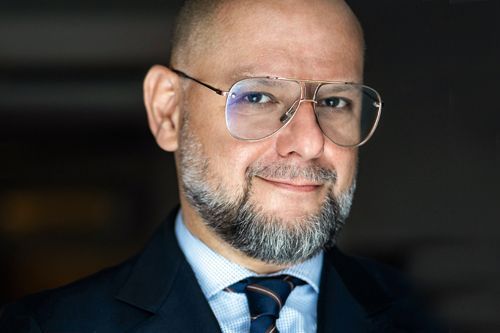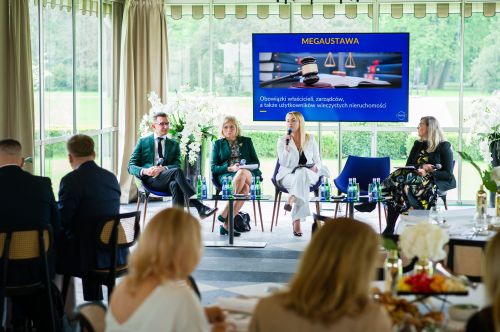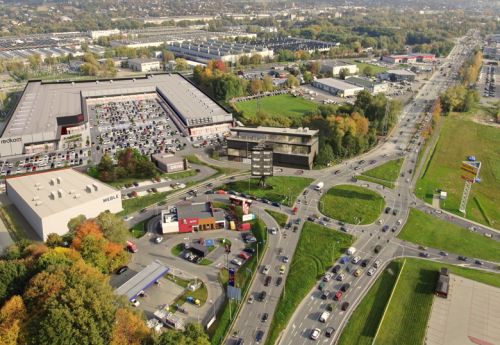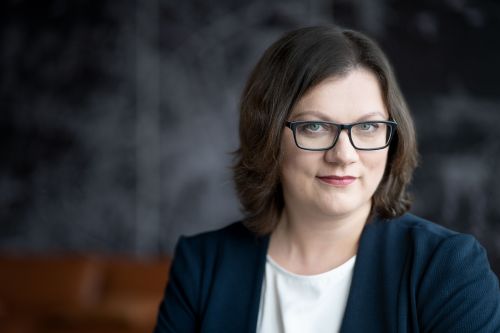The calm before before the storm
Feature
Ewa Andrzejewska, editor-in-chief, ‘Eurobuild CEE’: What role do you currently play at Griffin?
Przemysław Krych, founder, Griffin Real Estate: I’ve always wanted to have a business card that says ‘Przemek Krych, wizard’. I’m serious. Nobody can take it away from me that I was the founder of Griffin. Griffin turned out to be a success because I’ve always made sure that there are people in the company whose skills complement each other. The combination of myself, Maciek Dyjas and Nebil Senman is unique. Each of us is different and brings something different to the table. There is therefore a vision and a strategy; there are effective operational activities and, ultimately, strong analytics. This has made us successful, so why spoil it?
EA: What’s your typical day like now?
I come into the office for 4–5 hours and take care of the ‘important stuff.’
EA: What sort of ‘less important matters’ did Griffin’s boss have to deal with before?
These were meetings that didn’t contribute anything and only involved building up my or my counterpart’s self-esteem. I also no longer have to focus on the operational details. It’s impossible to do so with this scale of business. You have to trust people more, and they have to take on more responsibility. And this change took place in a natural way. The events that have taken place in my life have made me come to such conclusions more quickly. Otherwise, I would still be a workaholic who beavers away from 7 until midnight. Now I have more time for my personal life and I’m happy about that.
EA: I’ve heard from several sources that people are leaving Griffin. What lies around the corner for the company?
We are refreshing the team, which is also a generational change. Griffin is now different than it was twelve years ago. We now employ more younger people. Due to the fact that the pace of work at Griffin is quite hectic, some people can’t cope with it or want to spend more time with their families. You have to work really hard here. The younger ones are usually hungrier for success and have a different motivation than those who have already achieved something in their lives and earned some money. A few people – three or four – are leaving the company, but we are taking on a large number of new guys. We will be making official announcements about this over the next few months.
EA: New people for new tasks?
We’re working on new transactions. The hotel business will be a new area for us and our activity in this field will not be restricted to just Poland.
Tomasz Szpyt-Grzegórski, deputy editor-in-chief, ‘Eurobuild CEE: Will this involve a big transaction? And if so, how big?
We plan to buy a company and are in due diligence at this point. I can’t say any more about it yet. This acquisition will provide us with a strong entry into the hotel market. After its completion, the next step should be the acquisition of a hotel management platform along with a recognisable brand.
TSG: Which investors will be putting up the money for this?
We plan to make these acquisitions with a traditional investor line-up.
EA: What type of hotels are you interested in?
We want to bring an innovative approach to this segment. And the acquisition we are working on should provide us with that. As for our next steps – we will be operating in the three- or four-star hotel segment. I haven’t ruled out getting involved in leisure projects in more exotic locations.
TSG: What else is Griffin planning for next year?
We’re going to be as ingenious as ever. Over the last year we have closed the third largest real estate transaction in the world – a portfolio of 28 shopping centres. Larger ones have only taken place in Hong Kong and Singapore. In order to this, we have set up Resi4Rent and a logistics platform and are constantly acquiring new assets for them. Now we are focused on entering the hotel segment. As for next year, let’s talk agin in Q1. We have new ideas but I don’t want to reveal them just yet.
TSG: Will investors from outside the ‘traditional line-up’ be needed in order to carry them out?
Our relationship with all our existing investors has been great – they want to get involved in our projects, but we are also negotiating with potential new investors.
EA: Where from?
One is Asian and the other more traditional – from North America.
TSG: Does the plan to buy a global hotel platform mean that it’s hard to find attractive properties for Griffin in Poland?
It’s always worth diversifying. In my view and that of the experts we talk to, the Polish economy will slow down and this will happen soon. In such a situation even investment portfolios must be diversified.
EA: When will it slow down?
I think that this won’t happen in the next 18 months. It’s difficult to predict exactly when it will happen, but it will definitely take place.
TSG: What could put the brakes on for the Polish economy?
A global slowdown. The first few signs of one are already evident – the German and US economies are slowing down, interest rates are going up in the US. Poland is to a large extent a subcontractor for Germany, the economy of which depends on the global demand. If the German economy slows down, ours will also slow down. A great deal also depends on the relations between the US and China. History shows that there are no winners in trade wars. If this continues, it will have a significant impact on Germany’s export-oriented economy. The thing is that they should cope as they have the largest currency reserves in the world. It could be worse for the Polish economy. In contrast to the situation in 2008, we no longer have such cushions as: consumer demand, private sector investment, budget flexibility (75 pct of which is now rigid) or EU funds – because there won’t be any of those. The regulatory environment, the investment atmosphere and the risk assessment have also worsened. Poland is still managing to cope because other countries are doing poorly, such as Turkey, South Africa and Brazil. Things are still good for the Russian economy, but sanctions are still in place on that country. We are clearly the beneficiaries of the fact that these markets are struggling, as investors opt instead for Poland.
TSG: Is this the reason for the record turnover on the Polish investment real estate market?
This is the only explanation I can come up with, because I’m not seeing any admiration from investors for what is happening in Poland today. I’m not delighted with the way things are going myself, either. If the situation in other countries improves, investors will drift back to them.
TSG: So the recent classification of Poland by FTSE Russell as a developed countries is just PR...
This helps, of course. Every fund manager now has to invest some portion of its assets in Poland. We have been lucky in this respect. But this government, however, deserves no credit for this and it will not last long.
TSG: Are you not worried that you could be scaring investors off by saying that?
No. They know it already. They are big boys and know exactly what they are doing. If we look at the structure of capital flowing into Poland, we can see that traditional German capital is being deployed much more cautiously. A great deal of capital is now coming from South Africa and South-East Asia. For investors from these regions, the institutions of a democratic state under the rule of law are not the basic factors that determine the choice of a place to invest. They look at the economy and the global situation.
TSG: Well, Germany is still here...
For them the Polish economy is a derivative of their own economy. They will invest as long as they think it’s worth doing. In my opinion, Poland is no longer a state under the rule of law or a democratic state. We are politically where Russia and Turkey are, and economically where Russia is, except for the fact that sanctions have not been imposed on us. The European Union is turning away from us; a two-speed union is now an irrefutable fact, since Poland and the countries of Central and Eastern Europe will not be a priority in the next budgetary agenda. The EU will switch its focus to Southern Europe, Italy in particular.
EA: Is Italy also an investment direction for you?
Well, apart from Griffin, I’m also involved in other businesses and I’m currently putting a deal together in Cambodia.
EA: But what about Italy...
At the moment there’s an exodus of investors from Italy because it has chosen the same kind of nationalistic-socialist government we have in Poland. However, in contrast to Poland, the largest EU countries will not allow Italy to drift away. I am interested in Italy. It will be a very interesting investment market in 3–4 years.
EA: Are we talking about real estate?
I’m speaking more broadly, such as about the corporate market. There is, of course, a great deal of local capital and it won’t be easy to buy over there, but you will be able to find a few gems. I want to devote some time to this over the next few years.
TSG: Coming back to Poland, how are the relations between Echo Investment and EPP after the share deal between the two entities?
Very good. Both companies are working together perfectly. Echo and EPP are building Młociny and preparing Towarowa 22. This is a huge project – it will have offices, retail and apartments, so it has to be prepared well. Its Danish architects have developed a new concept that I really like and that will be unveiled at the beginning of next year.
EA: Which of Griffin’s platforms will be receiving capital in the near future? There has not been much talk about student halls recently.
Student Depot is developing very well – we have opened a student hall in Wrocław, which is fully rented. We already have five student halls in Poland and there will be more. A project is starting in Warsaw and construction will soon start in Gdańsk. We have enough capital to carry out these projects.
EA: And what’s next?
For sure we will want to raise additional capital for this venture. This could happen in the middle of next year. The company has proven that the concept works, it’s a good earner and it’s a market leader – so it will need capital for development.
TSG: The investment market is red-hot at the moment. Is this not a good time to sell and postpone any purchases until some ‘blood has been shed’?
I love this way of putting it... as it assumes that I’m some kind of guru and that others necessarily aren’t. But I hate doing business in such a way. My experience from the investment market clearly shows that someone will buy assets from me for two reasons: because the assets are very good and because they never lose their attractiveness. I prefer this kind of approach. I have slightly less affinity for the other, but I agree to do this at times – someone buys something from me because I bother them very much and I represent competition for them. However, if someone thinks that they have to find a more naïve person to sell something to them, then they themselves are being naïve. This might be thinking of somebody who has several buildings and wants to get rid of them because they have no vision for them. I won’t do business with someone like that. We are a different kind of investor: we look at platforms and with a long term perspective. If the market slows down, then we slow down too. If it bounces, then we bounce with it. However, never expect us to get involved in a garage sale. That’s just not us. I believe that good assets will always find a buyer.
TSG: For how long can we be an island of tranquillity in the economic storm?
There’s no need to panic. There should be no structural threats for the next 18 months. This is not just my own opinion. I have been talking about this with several of my friends who are better at macroeconomics than me. The conclusion is that things will still keep on rolling. And what will happen later on... ? No one can tell. Will there be a crisis? Yes, definitely – but when? It’s clear, however, that Poland will not be an island in the storm this time. It’s no longer possible.
TSG: Something is nevertheless driving the investment market – and Griffin has taken a large slice of it for itself. What’s now motivating those investing in Poland?
I’ve been attracting investors to Poland my entire professional life – at least since 1999. Due to my reputation I’ve been able to convince them that our country is the right location and to ‘sell Poland’ – or, to be more exact, sell them an idea for doing business in Poland. I’ve been doing this for the last twenty years. What I tell them is that this is a good, stable place to do business. It is predictable, a state under the rule of law, etc.! I can’t truthfully utter some of those words today. I can no longer tell them what I’ve been saying for two decades. However, getting to the heart of the matter: different investors and funds have their own agendas and investment profiles that determine their investment activity. Some are intended to last for some time, such as for five or ten years and that are then liquidated. This is required by the investors in these funds. Then we sell, not because we want to – we often don’t, but we must do it. If I could buy Echo Investment for my money, I would never sell it. I’d do the same with GPRE and EPP. If we were to exit these companies institutionally, I would invest my own money there. If a company pays dividends of 8–9 pct per year, it’s difficult to find a better investment. These are fundamentally good platforms. They can pay a bit more or a bit less but they will always pay out, better than the banks. Sometimes, however, our investors’ agenda is not consistent with mine. They are the ones that decide, though.
TSG: If you are earning so well from Polish real estate, why is local equity almost non-existent? The Czechs, Slovaks, Hungarians are all doing this better.
Local funds are investing. Most developers have domestic entities in their shareholding structures.
TSG: This is indirect investment, though. I mean investment in buildings or portfolios...
Poles are investing a great deal in rental apartments...
TSG: I’m not talking about individual investment.
We’ve only been making money for a quarter of a century.
TSG: As has been the case with our neighbours...
Reprivatisation was carried out differently for them. Nevertheless, the Polish market is certainly more transparent. We don’t have so many oligarchs. The country is not owned by several families whose members have somehow occupied the more prominent positions in the economy. Would you like to live in such a country? I wouldn’t. I would rather shoot myself in the foot and remain here; at least a middle class is developing here. We just need to survive populism somehow and shake it off. I much prefer it here to oligarchic economies and political capitalism.
TSG: However, the lack of local capital involvement in the investment market is not helping to enhance our good reputation around the world.
Indeed. For sure. There are always two sides to every story. On the one hand, foreign investors are asking: if there are no locals, what’s wrong with this market? Looking at it from a different angle: if locals invested, there would be a shortage of room for foreign companies. It’s difficult for foreign capital to enter the Czech Republic, Slovakia or Hungary, or even the Italian, French or German markets – as there is a great deal of local capital over there. That’s a problem we don’t have in Poland. The entry barrier is much lower.
TSG: What would Przemysław Krych invest in from his own wallet if it contained EUR 1 bln?
I don’t want to have such money. I think it is immoral to own such sums. If I had it, I would give it to charity. And I would do it again despite the fact that I was probably the first person in the world who was put in custody for charitable donations. Millions were spent on ‘taking credit for being a philanthropist’, as the judge put it. It was probably not enough... Up to PLN 9 mln was allocated to various initiatives and needs, but for some reason this is not enough to call yourself a philanthropist in this country. However, as a result of my personal experience we now have an official interpretation of what it is... according to our the justice system.
TSG: And if someone had a company worth this amount, which they would want to hand over to an effective manager...
If it was the case of stepping into someone’s breach, then this is a completely different discussion. I would undertake to do this, but as far as a billion dollars of cash is concerned, I still wouldn’t want it.
TSG: After twelve years of Griffin’s presence on the Polish market, what does its founder regret and what would he want to do once again?
The answer to both questions is similar because the partnership with Oaktree has played a huge role in Griffin’s history. Well, I could have done business with Oaktree in 2006 and probably the story would have developed more quickly, but I only did this in 2010 and it was the start of a great partnership. We have also made a lot of good personnel decisions and I’m very happy about that. What am I dissatisfied with... ? Well, the legal environment we have to operate in, but let’s leave it at that.
TSG: Isn’t there anything else?
I’ve always argued with Maciej Dyjas on this topic. His view is that this company is for making money and not a vehicle for charity. I thought differently, but today I regret it. Maciej was right. The ‘great achievement’ of the Polish authorities is that we have now closed all our charity operations.
TSG: The shop is closed?
The shop is closed. Not a penny more. Maybe the state will take care of it if it thinks it is omnipotent.
TSG: Could you give us a brief forecast for next year?
There should be no major risks over the next dozen or so months. We could, of course, get things wrong and be out by a few months or quarters. However, a crisis will eventually arise – this is certain. For now, new capital will continue to flow into the Polish market – from Asia. We can also count on it coming from the Persian Gulf. The ‘old’, western capital, however, will be more selective.
TSG: Why is that?
Because these institutions that only operate in states under the rule of law. That is essential to them. In terms of risk assessment, we are much further behind than we were three years ago. We are behind Kazakhstan and Russia in the ‘doing business’ ranking, which is much further from where we should be. ν
The wizard of Griffin
Przemysław Krych, the founder of Griffin Real Estate, is also the founder of the Cornerstone Partners private equity fund. He has many years of experience in management, investment and restructuring projects. In recent years he was the initiator and author of some of the largest and most important transactions on the Polish commercial real estate market, including the acquisition of Echo Investment. Under his leadership, Griffin has become one of the most active investors in the country, currently managing assets worth EUR 5 bln. He is a graduate of the Adam Mickiewicz University in Poznań, where he was awarded a master’s degree in law with a distinction.





















































